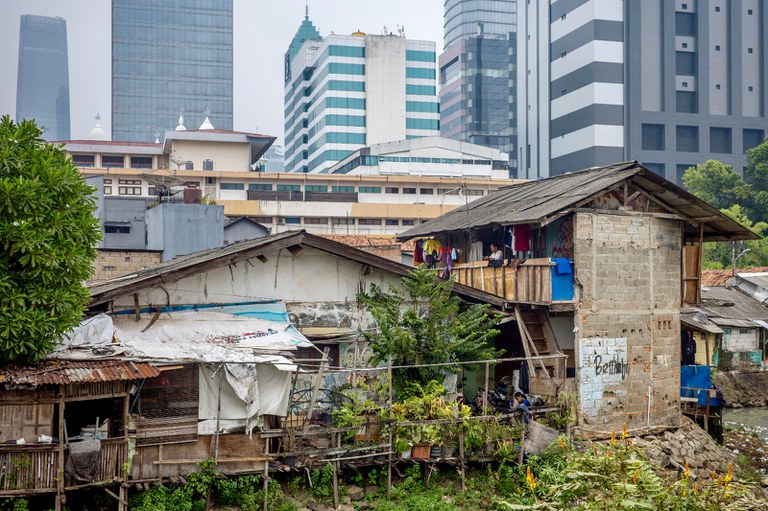Indonesian workers slam new rule ordering all employees to fund public housing
2024.05.29
Jakarta
Indonesia’s labor unions have slammed a new presidential regulation mandating a 3% deduction from public, private and freelance employees’ salaries to fund a national housing program, saying it would put an undue financial burden on workers.
Unions are also raising concerns that the regulation, which orders a 2.5% deduction from employees’ paychecks and an employers’ contribution of 0.5% of salaries, potentially overlaps with existing government housing programs.
President Joko “Jokowi” Widodo signed the regulation on Public Housing Savings, called Tapera, on May 20. The 1945 Constitution allows the president to issue such a regulation or decree in lieu of a law.
An Association of Indonesian Trade Unions (ASPEK Indonesia) official said the regulation would be an additional hardship amid inflation and a very small increase in the 2024 provincial minimum wages.
“We regret the government’s insensitive attitude towards the suffering of its people. … Saving is a right, not an obligation, let alone forced [saving for housing],” Sabda Pranawa Djati, secretary general of ASPEK Indonesia, told BenarNews.
“The government must not turn a blind eye to the condition of workers and others … They will become poorer and [suffer] long-term debt,” he added.
In April, inflation rose 3% from the same month in 2023, with inflation in the volatile food group at 9.63%.
Meanwhile, the minimum wage in Jakarta this year was increased to 3.38%, and the capital generally sees the highest rise among the provinces – there is no uniform minimum wage in the country.
‘Tapera is savings’
Jokowi on Monday addressed the criticism, saying every policy had its pros and cons.
“Of course, people are also calculating whether they can afford it or not, whether it’s difficult or not,” he said.
He cited the example of state-run health insurance, which he said faced similar pushback when it was introduced. As the insurance program kicked in, people started to experience the benefits, he said.

Under the new regulation, public, private and independent Indonesian employees who participate should have been working for at least 10 years or be married when they register for Tapera. Workers have to enroll no later than 2027.
Foreign nationals with work visas that are valid for at least six months would also have to participate.
Contributions end when the participant fulfills certain conditions, such as retirement, attaining the age of 58 for self-employed workers, or death, among others.
Public Works and Housing Minister Basuki Hadimuljon was at pains to emphasize that contributions to Tapera should not be seen as mere salary cuts, local news website Tempo reported.
“Tapera is savings. [Employees’] salaries don’t just get cut and disappear. The benefit is that people can get a house,” he said on Tuesday at an event in Jakarta.
‘Housing and land inflation’
However, the minister’s assertion is precisely what some critics take exception to.
Andy Ahmad Zaelany, of the National Research and Innovation Agency (BRIN), said it would be impossible to own a house on a Tapera scheme due to high housing inflation.
“Housing and land inflation in Indonesia is very high, especially as high demand causes land and house prices to continue to soar … this is no longer possible for lower middle-class people to achieve,” the senior researcher told BenarNews.
Labor Party Chairman Said Iqbal concurred.
“From common sense and mathematical calculations, Tapera contribution of 3% will not be enough for workers to buy a house at retirement age or when they are laid off,” he stressed.
The Employers’ Association (APINDO) highlighted that entrepreneurs, especially, would suffer even more.
APINDO Chairwoman Shinta Kamdani said she was against forcing entrepreneurs to register for Tapera, because they already have to compulsorily pay between 18.24% and 19.74% of their income for programs such as state-run health and social security.
“Apart from that, there [has been] a depreciation of the rupiah exchange rate and weakening market demand,” Shinta said in a statement.
“It’s getting harder for us.”

Some analysts such as labor expert Timboel Siregar worry that Tapera could conflict with other housing plans for private or state-enterprise workers that may have similar benefits.
“Just maximize what already exists for housing, so that workers and entrepreneurs don’t need to be burdened with other fees,” he told BenarNews.
Amid this backlash, Airlangga Hartarto, the coordinating minister for Economic Affairs, said on Wednesday that his ministry would review Tapera.
“We will check it later,” Airlangga said according to state news agency Antara.
“It will be referred for review by the public works and public housing minister.”








